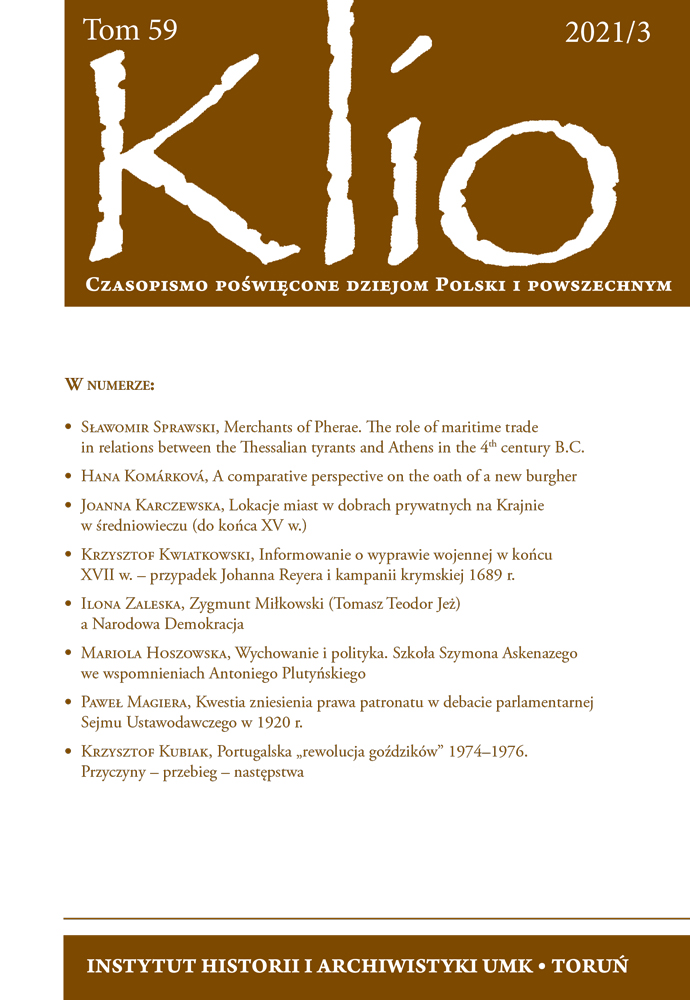Legenda o Pikusie w kronikach późnego antyku – źródło wyobrażone. Uwagi do książki Krzysztofa Hilmana Pikus w Kronice aleksandryjskiej i u Malalasa. Narodziny mitu u schyłku antyku, Kraków 2019
DOI:
https://doi.org/10.12775/KLIO.202.029Słowa kluczowe
Pikus-Zeus, Jan Malalas, Excerpta Latina Barbari, kronikarstwo późnego antyku, euhemeryzacjaAbstrakt
Opowieść o rodzie Pikusa, legendarnego władcy Lacjum, w dziełach kronikarskich późnego antyku poprzedza panowanie Eneasza, królów Alba Longa czy Romulusa i Remusa. Artykuł zawiera uwagi krytyczne wobec książki Krzysztofa Hilmana, który podejmuje się analizy tej opowieści w trzech źródłach powszechnie uznawanych za kroniki - tzw. Kronice miasta Rzymu, Excerpta Latina Barbari (Kronice aleksandryjskiej) oraz kronice Jana Malalasa. Autor postuluje narodziny opowieści o Pikusie-Zeusie w późnym antyku, choć występuje ona w wielu wcześniejszych źródłach np. u Wergiliusza czy Diodora. Autorka wykazuje również niewiarygodność hipotezy Hilmana o domniemanym źródle pośrednim („euhemerystycznym opowiadaniu italskim”), poprzez które tytułowy Pikus miał zostać zaczerpnięty z Kroniki miasta Rzymu do Kroniki aleksandryjskiej i dzieła Malalasa.
Bibliografia
Bibliografia:
Źródła:
Aristotle Poetics. Editio Maior of the Greek Text with Historical Introductions and Philological Commentaries, ed. L. Tarán, D. Gutas, Leiden – Boston 2012.
Cassiodori Senatoris Institutiones, ed. R. A. B. Mynors, Oxford 1937.
Chronica minora saec. IV, V, VI, VII, ed. Th. Mommsen, vol. 1, MGH 1, Berolini 1892.
Chronica minora, vol. 1: Accedunt Hippolyti Romani praeter canonem paschalem fragmenta chronologica, ed. C. Frick, Lipsiae 1892.
Die Chronik des Hieronymus, ed. R. Helm, Berlin 1956.
Apocalypse of Pseudo-Methodius. An Alexandrian World Chronicle, ed. B. Garstad, London 2012
Georgii Syncelli Ecloga chonographica, ed. A. Mosshammer, Leipzig 1984.
Ioannis Malalae Chronographia, rec. E. Chilmead, Oxonii 1691.
Ioannis Malalae Chronographia, rec. I. Thurn, Berolini – Novi Eboraci 2000.
Ioannis Malalae Chronographia, rec. L. Dindorf, Bonnae 1831.
Iulius Africanus Chronographiae, ed. M. Wallraff et al., Berlin – New York 2007.
Joseph Justus Scaliger, Thesaurus temporum. Eusebii Pamphilii Cesarea Palestinae episcopi, Chronicorum Canonum, Leiden 1606.
Ovid. Fasti, ed. A. Wiseman, P. Wiseman, Oxford 2013.
P. Ovidi Nasonis Metamorphoses, ed. R. J. Tarrant, Oxford 2004.
The Chronicle of John Malalas, transl. E. Jeffreys, M. Jeffreys, R. Scott, Melbourne 1986.
Wergiliusz, Eneida, tłum. Z. Kubiak, Warszawa 1987.
Literatura:
Boedeker D., Early greek poetry as/and history [w:] The Oxford history of historical writing. Volume I: beginnings to AD 600, New York 2011.
Brodka D., Die Weltchronik des Johannes Malalas und die Kirchengeschichte des Nikephoros Xanthopulos Kallistos [w:] Die Weltchronik des Johannes Malalas…, Stuttgart 2016, , s. 287-310.
Brodka D., Eustathios von Epiphaneia und Johannes Malalas [w:] Die Weltchronik des Johannes Malalas..., Stuttgart 2017, s. 155-183.
Burgess R.W., Kulikowski M., Mosaics of Time. The Latin chronicle traditions from the first century BC to the sixth century AD. Volume I: A historical introduction to the chronicle genre from its origins to the high middle ages, Turnhout 2013.
Burgess R.W., The Chronograph of 354: Its manuscripts, contents, and history, “Journal of Late Antiquity” 2012, vol. 5.
Burgess R.W., The date, purpose, and historical context of the original Greek and the Latin translation of the so-called "Excerpta Latina Barbari", "Traditio" 2013, vol. 68, s. 1-56.
Cameron A., Greek Mythography in the Roman World, New York 2004.
Den Boer W., Graeco-Roman historiography in its relation to biblical and modern thinking, “History and Theory” 1968, vol. 7. 1, s. 6-75.
Die Weltchronik des Johannes Malalas im Kontext spätantiker Memorialkultur, J. Borsch. O. Gengler, M. Meier, (Hg.), „Malalas Studien“, Bd. 3, Stuttgart 2019.
Die Weltchronik des Johannes Malalas. Autor – Werk – Überlieferung, M. Meier, Ch. Radtki, F. Schulz (Hg.), „Malalas Studien“, Bd. 1, Stuttgart 2016.
Die Weltchronik des Johannes Malalas. Quellenfragen, L. Carrara, M. Meier, Ch. Radtki-Jansen (Hg.), „Malalas Studien“, Bd. 2, Stuttgart 2017.
Gezler H., Sextus Iulius Africanius und die byzantinische Chronographie, Leipzig 1898.
Hardie P., Fame’s narratives. Epic and History [w:] Narratology and interpretation. The content of narrative form in ancient literature, Berlin – New York 2009.
Hilman K., Źródła oraz ich interpretacja w pierwszych 9 księgach kroniki Jana Malalasa, Archiwum Uniwersytetu Jagiellońskiego, sygn. dokt_2014_209, Kraków 2014.
Horsfall N., Virgil, Aeneid 7, A commentary, Leiden–Boston– Köln 2000.
Jeffreys E., Croke B., Scott R., Studies in John Malalas, Leiden – Boston 1990.
Johnson J.W., Chronological writing: its concepts and development, “History and Theory”1962, vol. 2. 2, s. 124-145.
Kokoszko M., Descriptions of personal appearance in John Malalas’ Chronicle, “Byzantina Lodziensia”, t. II, Łódź 1998.
López-Ruiz C., ‘Not That Which Can Be Found Among the Greeks:’ Philo of Byblos and Phoenician Cultural Identity in the Roman East, “Religion in the Roman Empire” 2017, vol. 3.3, s. 366-392.
Momigliano A., Greek Historiography, “History and Theory”1978, vol. 17.1, s. 1-28.
Moorton R., The Genealogy of Latinus in Virgil’s Aeneid, „Transactions of the American Philological Association (1974-2014)”1988, vol. 118, s. 253-259.
Philologisch-historischer Kommentar zur Chronik des Malalas. Dostęp online: malalas.hadw-bw.de.
Recherches sur la chronique de Jean Malalas I, éd. J. Beauchamp, “Monographies”, vol. 15, Paris 2004.
Recherches sur la chronique de Jean Malalas II, éd. S. Agusta-Boularot (et al.), “Monographies”, 24, Paris 2006.
Rosivach V.J., Latinus' Genealogy and the Palace of Picus (Aeneid 7. 45-9, 170-91), “The Classical Quarterly”, 30, 1, 1980, s. 140-152.
Rzeźnicka Z., Kokoszko M., Dietetyka i sztuka kulinarna antyku i wczesnego Bizancjum (II–VII w.), Część III: Ab ovo ad γάλα. Jajka, mleko i produkty mleczne w medycynie i w sztuce kulinarnej (I-VII w.), „Byzantina Lodziensia XXVIII, Łódź 2016.
Von Picus bis Licinius. Historischer Kommentar zu den "Chronica urbis Romae" im Chronographen von 354, ed. G. Pfund, Stuttgart 2021.
Pobrania
Opublikowane
Jak cytować
Numer
Dział
Licencja
Prawa autorskie (c) 2021 Paulina Zagórska

Utwór dostępny jest na licencji Creative Commons Uznanie autorstwa – Bez utworów zależnych 4.0 Międzynarodowe.
Statystyki
Liczba wyświetleń i pobrań: 451
Liczba cytowań: 0



